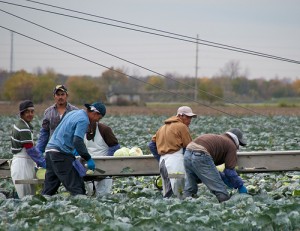Female Farm Workers Often Victims Of Sexual Violence
 By Kalyn Belsha, Voxxi
By Kalyn Belsha, Voxxi
Female farm workers in the United States are particularly vulnerable to sexual violence and harassment, a report from Human Rights Watch released May 16 found.
The advocacy organization is calling on Congress to support legislation that protects survivors of sexual violence, regardless of immigration status, and to repeal programs such asSecure Communities that require or encourage local police to act as federal immigration officers, which discourages victims from reporting abuse for fear of deportation.
Vulnerable population
There are more than 3 million migrant and seasonal farm workers in the U.S., and about one-quarter of farm workers are female, according to the Human Rights Watch report, which relied on 2009-2010 federal government data.
About 3 percent of female farm workers are under 18. While many adult female farm workers work with their husbands, others are single mothers who migrated to the U.S. to support their families back home.
Because of the sensitive nature of reporting sexual violence, language barriers and the transient nature of the population, it’s extremely difficult to pinpoint how many female farm workers suffer sexual violence and harassment, which can include rape, attempted rape, verbal abuse, unwanted touching and pressure to engage in sexual relations.
Fear of retaliation
Human Rights Watch interviewed 52 farm workers, 25 of whom were survivors of sexual violence or harassment. Previous reports estimate between 60 and 80 percent of female farm workers have experienced some form of sexual harassment.
The new report determined that sexual violence and harassment often goes unreported for a number of reasons: women are afraid if they report the abuse they will lose their jobs or bedeported. And because many women work alongside their families and live on the farms, losing a job would likely take away an entire household’s income and make them homeless.
Female farm workers who reported incidents or tried to push back against the abuse alsoreported suffering retaliation such as more abusive treatment and getting fewer hours of work.
The report found “girls and young women, recent immigrants, single women working alone and indigenous workers” were most at risk for sexual harassment as farm workers.
A national problem
While this problem exists in many businesses where women lack English skills and fearlaw enforcement,experts say, because farms are large-scale employers, where power imbalances exist between farmhands and low-wage immigrant workers, they see a higher incidence of abuse. The Human Rights Watch investigation found that “in most cases, perpetrators are foremen, supervisors, farm labor contractors, company owners, and anyone else who has the power to hire and fire workers as well as confer certain benefits, such as better hours or permission to take breaks.”
Few female farm workers have access to rape crisis centers or similar agencies, the report found, and the few that exist don’t always provide services in languages other than English.
“The goal of our report was to show that this was a national problem,” the report’s author Grace Meng told the Associated Press. “And to demonstrate it’sa human rights problem.”
You may follow Kalyn Belsha on Twitter
This article first appeared in Voxxi.
[Photos By Bob Jagendorf]
